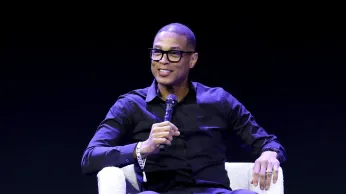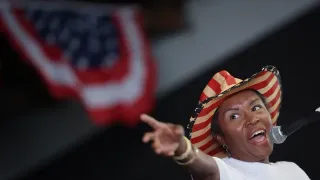
4 hours ago
Don Lemon on Grindr, Gay Republicans, and Outing
READ TIME: 3 MIN.
Don Lemon, the openly gay former CNN anchor, recently appeared on the “Club Random” podcast with Bill Maher, where he spoke candidly about his experiences as a gay Black man in media and the shifting landscape of journalism in the digital age. During the conversation, Lemon recounted his interactions at Republican events, offering pointed observations about the presence of closeted gay men and their behavior at such gatherings. He stated, “If there’s a Republican event or a convention, I try to stay in my hotel room because they hit on you more—150% yes” .
Lemon’s comments touched on an oft-repeated anecdote in LGBTQ+ circles: that the dating app Grindr “crashes” or becomes unusually active during Republican conventions. This claim, while difficult to independently verify with hard data, has circulated widely on social media, with several Instagram reels and posts echoing Lemon’s assertion that “Grindr always crashes during Republican conventions because Republicans are so repressed and they can't be their true selves” .
Lemon elaborated that the app’s spike in activity was due to married men, whose wives may be occupied elsewhere, seeking discreet hookups. He described a scenario set in Maui’s Four Seasons hotel, where “Grindr was very active with the bathroom in the lobby,” further reinforcing the idea of closeted behavior in conservative spaces .
The viral nature of these statements has sparked debate online. Some commenters have challenged the veracity of the claim, demanding “proper debate and facts that we can prove,” while others have embraced the story as a humorous reflection of political hypocrisy . Lemon himself characterized the phenomenon as a product of repression and internalized homophobia among some conservative men, suggesting that “every accusation is a confession” .
The conversation turned to the subject of outing—the act of publicly revealing someone’s LGBTQ+ identity without their consent. Lemon’s remarks, widely quoted and discussed, implied that he possesses “receipts” on closeted Republican men using Grindr and that he might be prepared to “out” them if necessary. According to coverage in Queerty, Lemon reportedly said, “I’m gonna out you,” referencing unnamed individuals who he claims preach anti-LGBTQ+ rhetoric while privately seeking same-sex encounters .
These statements have reignited long-standing debates within the LGBTQ+ community regarding the ethics of outing. Historically, outing has been viewed as a violation of personal privacy, but some argue that it may be justified in cases where a public figure actively works against LGBTQ+ rights while concealing their own identity. Lemon’s comments straddle this line, suggesting accountability for hypocrisy while acknowledging the risk of harm to individuals who may not be ready or safe to come out .
Lemon’s approach appears to be grounded in the belief that visibility and honesty can combat repression, particularly in political environments where anti-LGBTQ+ policies persist. However, he stopped short of naming names, reportedly saying, “I understand why , but I wish Lemon would name names,” as echoed by some followers on social media .
Lemon’s remarks have prompted a spectrum of responses from LGBTQ+ activists, journalists, and community members. Many see his comments as a call for greater authenticity and transparency among public figures, especially those whose actions directly impact LGBTQ+ lives. Others caution that forced outing can perpetuate trauma and risk personal safety, emphasizing the need for empathy and consent in matters of identity disclosure .
The phenomenon of increased Grindr activity at conservative events has become something of a cultural meme, but its underlying message points to persistent challenges faced by LGBTQ+ people in environments where acceptance is limited. Lemon’s observations underscore the complex intersection of personal freedom, public accountability, and social stigma—issues that remain central to the ongoing fight for LGBTQ+ equality.






